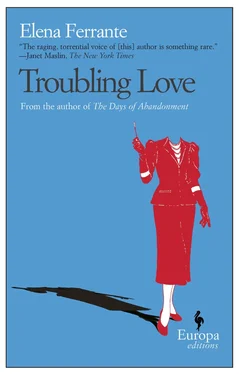I pulled open the little door and shone the beam of the flashlight inside. I squatted down, knees against my chest, head tilted. Bent over like this, I slid down three slippery steps. I agreed, on the way, to tell myself everything: whatever truth the lies preserved.
I was surely Amalia when, one day, I found the pasticceria empty and the little door open. I was Amalia, who, naked as the Gypsy painted by my father, around whom insults, oaths, threats had been flying for weeks, slipped into the dark cellar with Caserta. I was, in the past tense. I felt I was her, with her thoughts, free and happy, having escaped from the sewing machine, the gloves, the needle and thread, my father, his paintings, the yellow paper on which she ended up in blood-red scrawls. I was identical to her and yet I suffered because of the incompleteness of that identity. We succeeded in being “I” only in the game now, and I knew it.
But Caserta, stooping at the bottom of the three steps beyond the door, looked at me obliquely and said, “Come.” While I invented his voice giving sound to “Amalia,” along with the verb, he ran a knotty finger, dirty with cream, lightly up one leg, under the dress my mother had sewed for me. At that touch I felt pleasure. And I realized that the obscene things that the man was mumbling hoarsely, as he touched me, were happening in detail in my head. I memorized them and it seemed to me that he said them with a long red tongue that spoke not from his mouth but from his pants. I was breathless. I felt pleasure and fear at the same time. I tried to contain both, but I realized resentfully that the game wasn’t going well. It was Amalia who felt all the pleasure: only fear was left for me. The more things happened, the more irritated I became, because I couldn’t be “I” in her pleasure, and I could only shudder.
Besides, even Caserta wasn’t convincing. Sometimes he managed to be Caserta, sometimes his features faded. This alarmed me more and more. It was happening the way it did with Antonio: during our games, I was Amalia with conviction, he was his father fleetingly, maybe for lack of imagination. I hated him then. If he was Antonio, then I was merely Delia, down in the cellar, with one hand on his sex; and meanwhile, somewhere, Amalia was playing at being really Amalia, excluding me from her game just as the girls in the courtyard sometimes did.
So at a certain point I had to give in and admit that the man who said to me “Come” at the bottom of the three cellar steps was the seller of coloniali , the dark old man who made ice cream and sweets, the grandfather of little Antonio, the father of Caserta. But Caserta no: Caserta was certainly somewhere else, with my mother. So I pushed him off and ran away crying. I jumped onto the fragment of floor where my father was, the easel, the bedroom. I reported to him, in the coarse dialect of the courtyard, the obscene things that man had done and said to me. I wept. I had clear in my mind the old man’s face disfigured by the flush of his skin and by fear.
Caserta, I said to my father. I said to him that Caserta had done and said to Amalia, with her consent, in the basement of the pastry shop, all the things that in reality Antonio’s grandfather had said and perhaps done to me. He stopped working and waited for my mother to return home.
To speak is to link together lost times and spaces. I sat on the top step, believing it was the same step as then. One by one, I whispered to myself the obscene formulas that Caserta’s father had repeated with growing agitation forty years earlier. And I realized that, in substance, they were the same that my mother had cried to me, giggling, over the telephone, before going to drown herself. Words for being lost or for being found. Maybe she wanted to communicate to me that she, too, hated me for what I had done to her forty years earlier. Maybe in that way she wished to make me understand who the man was who was there with her. Maybe she wanted to tell me to watch out for myself, to beware of Caserta’s senile ravings. Or maybe she simply wanted to show me that those words, too, could be uttered, and that, contrary to what I had believed my whole life, they couldn’t hurt me.
I seized on that last hypothesis. I was there, curled up on the threshold of tormented fantasies, to see Caserta and tell him that I had never wanted to hurt him. The story between him and my mother no longer interested me: I wished only to confess aloud that, then and later, I had hated not him, perhaps not even his father: only Amalia. It was she I wanted to hurt. Because she had left me in the world to play alone with the words of a lie, without limits, without truth.
But Caserta didn’t appear. In the basement there were only empty cardboard boxes and old carbonated water or beer bottles. I crawled out, dusty, irritated by the light touch of spiderwebs, and returned to the cot. On the floor I saw my bloodstained underpants and kicked them under the bed with the toe of my shoe. Now it bothered me more to find them in that place, like a purloined part of myself, than to imagine the use that Caserta had made of them.
I went back to the wall where Amalia’s blue suit was hanging. I took down the hanger, I laid the garment delicately on the bed, I removed the jacket: the lining was threadbare, the pockets were empty. I held it against me as if I wanted to see how it looked. Then I made up my mind: I put the flashlight down on the cot, I took off my dress and left it on the floor; then I dressed again, carefully, without haste. I used the safety pin that Caserta had used to attach the bra to the shirt to take in the waist: it was too big. The jacket, too, was large and yet I arranged it to my satisfaction. I felt that that old garment was the final narrative that my mother had left me, and that now, with all the necessary adjustments, it fit me like a glove.
The story might be more fragile or more interesting than the one I had told myself. It was enough to pull out a single thread and follow it in its simplifying linearity. For example, Amalia had left with her old lover and with him had spent a final secret vacation, laughing loudly, eating and drinking, stripping on the beach, putting on and taking off the clothes that she intended to give me. The game of an old woman pretending to be young, to please another old person. Finally, she had decided to go swimming naked. But, bright as it was, she had gone too far from the shore and had drowned. Caserta had been afraid, had picked up everything and left. Or she was running naked along the water’s edge and he was following, both of them panting, both terrified, she by the discovery of his desires, he by her rejection. Until Amalia thought that she could escape into the water.
Yes, it was enough to pull one thread to go on playing with the mysterious figure of my mother, now enriching it, now humiliating it. But I realized that I no longer felt the need, and I moved in the ray of light just as it seemed to me that she had moved. I turned off the flashlight and leaned toward the bluish triangle of the shutter to stick my head out. The streetlamps were on, but there was still light. The children were no longer running and shouting. They were gathered around a man who was crouching, his face at the height of their faces, his hands on his knees. The man was Caserta. He had thick white hair and an engaging look. They were all standing, the little ones, the big one, with their shoes in a puddle that shone in the light. The children had begun to unwrap the candies that he had just handed out.
I looked at that lean old man, carefully shaved, well dressed, his face pale and tense, and I no longer felt the need to speak to him, to know, to let him know. I decided to steal away along the sidewalk, around the corner, but he turned and saw me. His astonishment was such that he didn’t realize what was happening behind him. The man in the undershirt had leaned the bar against the wall carefully, had thrown away his cigar, and now was approaching, looking straight ahead, chest erect, short legs taking rational, calm steps. The children backed away, retreating from the puddle. Caserta remained alone in the mirror of the violet water, mouth open, eyes staring at me without anxiety. That tranquility helped me breathe. I went back into the Coloniali of forty years earlier, I was careful not to bump into the counter with its palm trees and camels, I climbed onto the wooden platform, crossed the pasticceria, expertly skirting the oven, the machines, the counters, the pans, went out the door that opened onto the courtyard. Once in the open I searched for the proper pace of a grownup person who is not in a hurry.
Читать дальше












